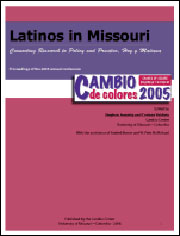Proceedings of the 2005 annual conference
Editor's note
The following abstract describes a publication that is only available as a downloadable PDF.
In 2005 the program is stressing efforts that impact policy-making and shape the practices being implemented in communities. To what extent is research affecting policy? What kinds of programs and practices are resulting? What are the policy implications of current and ongoing research efforts?
The presentations in the conference are mostly the result of a Call for Abstracts announced during the fall of 2004. The conference format includes five Plenary Sessions, and four blocks of concurrent breakout sessions addressing research, best practices, workshops and discussion panels on the themes of the conference. Also, there are poster and table display sessions, learning stations, and multiple opportunities for networking.
The five conference themes are:
- Change and Wellbeing: social political and economic changes and the approaches to facilitate the acceptance and integration of newcomers in rural and urban communities.
- Civil Rights: legal challenges, with a focus on positive legal changes that strive for towards a legislative agenda.
- Education: from early to higher and adult education; addressing complexity, cultural differences, the achievement gap, implications of the No Child Left Behind Act, barriers to access to higher education, and rural and urban schools.
- Health: access, quality, cultural competence, language barriers, policies, alternative health providers.
- Youth, Families, and Communities: identity, youth development, adaptation, behavior, mentoring, family and sending and receiving community issues.
This publication includes abstracts, as well as selected papers, on some of the topics discussed during the 2005 Cambio de Colores conference. Also included is a list of participants.
Session summaries and abstracts
Change and integration
- Youth, Families and Community
- Latinos in Missouri: Connecting Research to Policy and Practice — Hoy y Mañana
- Newcomer, Settler and Second-Generation Hispanic/Latino Audiences: Delivering The Right Programs To The Right Audiences.
- Latino Parents and The Context of Reception for Child Rearing in the United States
- Running Successful Extension Camps for Hispanic Children: From Program Planning to Program Delivery for a One-Week Day Camp.
- Patriarchal Perceptions of the Use of Birth Control Methods Among Recent Hispanic Immigrants in Boone County, Mo.
- Catholic Family Services — Southside: Hispanic Family Counseling Project
- Sending Communities: The Stories of Women and Migration in Rural Communities
Health
- Creating a Model for Training in Medical Interpreting and Cultural Competency
- Assessing the Needs of Persons with LEP in Assessing Family-Planning Services in Missouri
- Tobacco is Targeting Our Youth Latinos
- Secondhand Smoke: A Worksite Rights Issue for Hispanics in the Service Industry
- Academic and Community Collaboration through the Salud para la Vida (Health for Life) Project
- The Impact of the 1996 Welfare, Medicaid and Immigration Reform Legislation on Access to Health Care for Low-Income Latina Women
- A Confessional Tale of Diabetes in a Latina Woman
- Binational Health Week
- Diabetes Education by Phone to Hispanic Populations Using an Automated Call Center
- Community Partners for Parkinson Care: Linking Local Parkinson’s Disease Resources with Diverse
and Underserved Communities - Cultural Competency and Mental Health in the Hispanic Community of Jackson County, Mo.
- Factors Influencing Family Planning Decision-Making Among Hispanic Immigrants: Results from Focus Groups, Q-sort and Survey
- Childhood Obesity
- Social Factors Impacting Health in Southwest Missouri’s Immigrant Latino Population
- Obesity Prevention in the Hispanic Community
- The Cambio Center: Toward a New Model in Latino and Latin-American Studies
Education
- No Child Left Behind — Where are we now?
- Including Migrant Students in No Child Left Behind
Contents
- How to Create a Partnership that Works for your Community: The After-School Program
- Minority Scholarships: Social Need versus Legality
- Enrolling and Retaining Latinos in Higher Education: Practical Considerations
- What Happens to a Dream Deferred? — The Case of Undocumented Students
- Latino and Latina Psychology Research: A Trend Analysis of Five Professional Journals
- Latino Student Organizations
- Trends in the Perception of School Climate and Community Satisfaction in Areas Receiving Hispanic Migration in Missouri During the Past 15 Years.
- Increasing Undergraduate Research Experiences to abet Graduate Persistence for Underrepresented Students
- Improving Academic Achievement among Hispanic Students.
- Opening Academic Doors for Hispanic Students with Study Technology
- Shifting Immigration Trends in Missouri and Implications for the No Child Left Behind Act
- Strengthening Home-School Communication with PPP
- The Hispanic Challenge Challenged: A Positive Interpretation of the Hispanic Presence in the U.S. and Midwest
- Latino Entrepreneurs in Missouri: Policy Implications for Small Business Assistance Programs
- Change and Well-being
Medline
- Hispanos in la Prensa: Reactions, Perceptions, and Coverage of Missouri’s Black Press Toward Latino/Hispanic Growth
- Cash Assistance Patterns for Noncitizens in Missouri
- The Use of Internet Mapping as a Tool to Support Latino Population Change Assessment and Community Decision-Making
- The Criminalization of Immigration Law
- Latinas Overcoming Social Class Obstacles
- Responding to Weather Warnings — A Particular Challenge to the Non-English Community
- Understanding Latinos' Economic Livelihoods, Civil Rights and Opportunities in Missouri to Inform Policies to Achieve Well-Being
- The Context of Reception and Latinos in Missouri Communities
Selected papers
- Fostering Change for Immigrant Latinos Through Radio Communications: The Case of a Central Missouri Community
- The Nature and Extent of Latino Immigrants' Communication with Their Children About Sexual Issues
- Bilingual Education
- Immigration Reform: Comprehensive Solutions for Complex Problems
Topics
- Immigration
- Research
- Best practices
- Policy
- Immigrants
Pages
- 88
 Edited by Stephen Jeanetta and Corinne Valdivia
Edited by Stephen Jeanetta and Corinne Valdivia